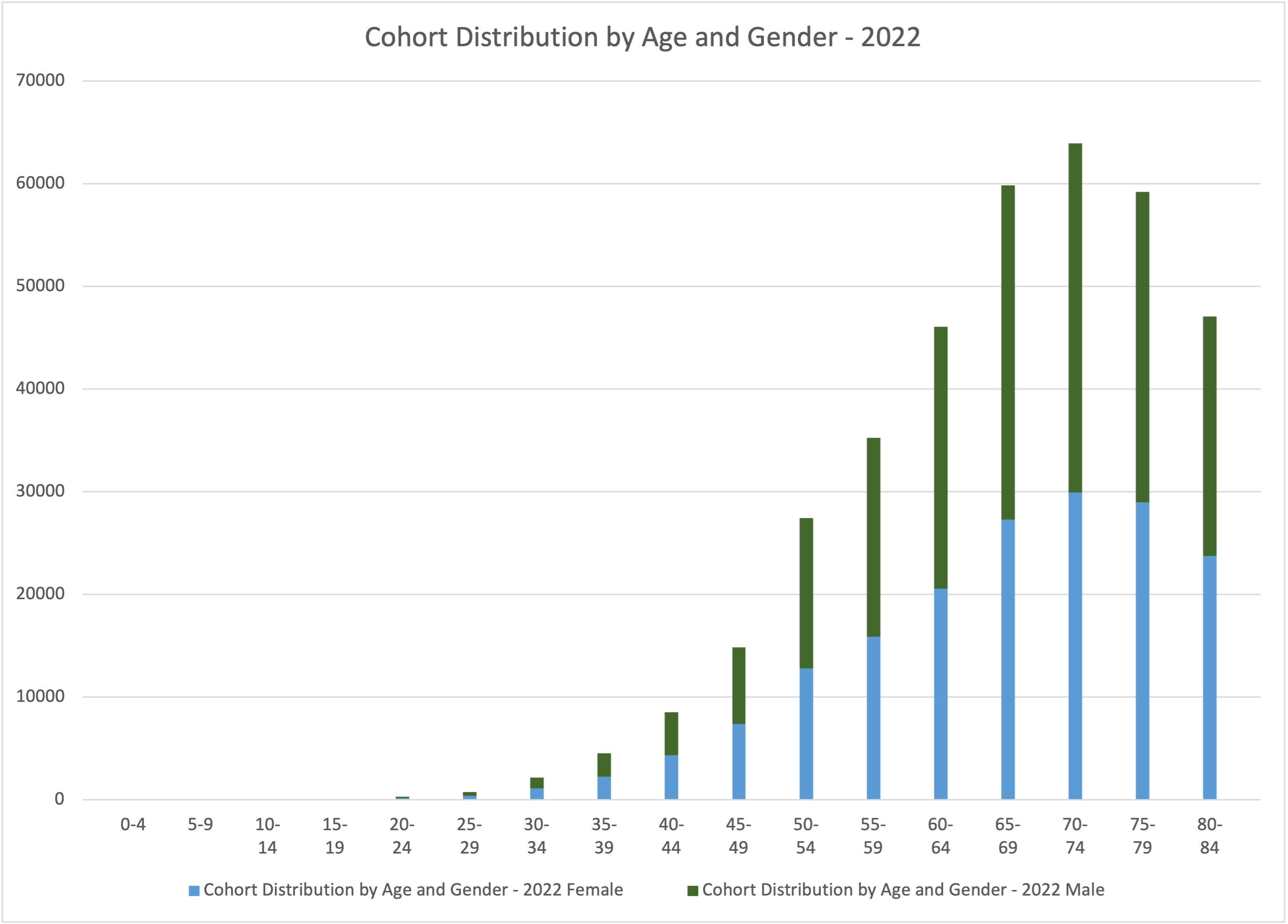Colorectal Cancer Awareness Month is observed in March to highlight the importance of screening for colorectal cancer, as well as to promote healthy lifestyle habits that can decrease a person’s risk of developing cancer of the colon, rectum or anus – the three distinct cancer types referred to as colorectal cancer (CRC).
CRC Is the third most common type of cancer worldwide. In 2020, almost 2 million cases were diagnosed. It is also the second most common cause of cancer death, which is almost 1 million deaths per year.
At PurpleLab, we have access to large amounts of healthcare claims data. Using the PurpleLab HealthNexus™ platform provides data scientists with easy access into the claims to look at trends in a large population. While the majority of cases occur in people between the ages of 55 to 75, there is an uptick in the younger patient population. Many factors have been considered for this uptick in younger patients with CRC, and further research needs to be conducted to determine what factors may be causing this.
IARC (organization that classifies carcinogenic properties affecting humans) researchers have proven that various factors can increase or decrease a person’s risk of developing colorectal cancer. Most of these factors also affect the risk of developing other cancer types, similarly, increasing or decreasing it.
- Alcohol consumption was responsible for more than 160,000 new cases of colorectal cancer in 2020, or 8% of all cases of the disease diagnosed that year. Alcohol consumption also increases a person’s risk of developing at least six other cancer types, including liver cancer and breast cancer.
- Other known colorectal cancer risk factors include tobacco smoking, which also causes lung cancer, and HPV infection, which also causes cervical and penile cancer.
- Obesity is another factor that increases the risk of developing CRC. Obesity was responsible for more than 85,000 cases of colon cancer and 25,000 cases of rectal cancer diagnosed in 2012, about 23% of all cases of CRC diagnosed that year. Obesity also increases a persons risk of developing at least seven other cancer types.
- A sedentary lifestyle can also be a factor in developing CRC.
According to the American Cancer Society (ACS), decreased alcohol consumption, weight loss, increased physical activity and diets rich in whole grains, fruits, and vegetables, and low in red and processed meats, probably lowers CRC risk, although it’s not clear which factors are more important. Obtaining regular screening can increase the chances of detecting colorectal cancer when it is at an earlier and potentially at a more manageable and treatable stage.
Although overall CRC mortality continues to decline, this progress is affected by a rapid change of disease activity that shows less favorable trends ahead. In May 2018, the ACS changed its screening guidelines from 50 to 45 in response to rising rates of CRC occurring in younger people. First, the CRC burden is shifting to younger individuals as cohorts born in the last half of the 20th century who have elevated risk age; one in five new cases now occur in individuals in their early 50s or younger. Second, there is an overall shift to later stage disease, with more individuals now diagnosed at an advanced stage than in the mid-1990s before widespread screening. Although a substantial proportion of CRC deaths can be prevented through screening, four in 10 Americans aged 45 years and older are not up to date nationally. Screening is especially low among younger individuals and those without health insurance. Reducing CRC inequalities and furthering progress could be achieved by encouraging healthier lifestyles and ensuring equitable access to high-quality health care for all individuals, especially those in rural and other low-resource areas. In addition, research is needed to evaluate causes for rising CRC incidence and to advance treatment options for tumor subtypes without effective therapies.
The American Cancer Society recommends that people at average risk of CRC start regular screening at age 45. People who are in good health and with a life expectancy of more than 10 years should continue regular CRC screening through the age of 75.
Test options for colorectal cancer screening include:
Stool-based tests:
- Highly sensitive fecal immunochemical test (FIT) every year
- Highly sensitive guaiac-based fecal occult blood test (gFOBT) every year
- Multi-targeted stool DNA test (mt-sDNA) every 3 years
Visual (structural) exams of the colon and rectum:
- Colonoscopy every 10 years
- CT colonography (virtual colonoscopy) every 5 years
- Flexible sigmoidoscopy (FSIG) every 5 years
If you’re age 45 or older you should start getting screened for CRC. Early detection when CRC is small can make it easier to treat and potentially provide better outcomes.
Having access to Real World Data enables healthcare data analysts to delve into common diseases and understand trends by looking at a large population of people with the condition. PurpleLab’s HealthNexus platform is designed to make these queries easy to execute and provide answers in a timely manner.
